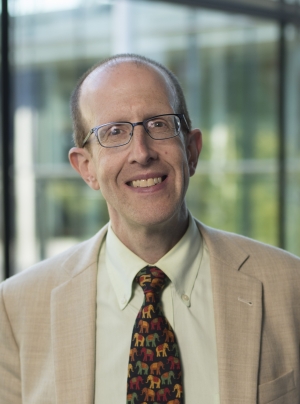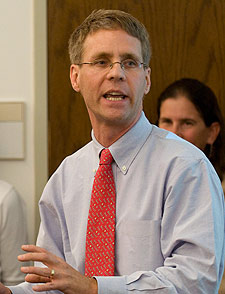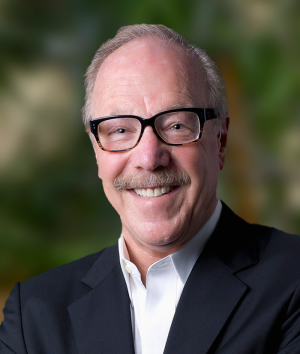
Howard Forman
‘HIS JOY FOR HIS WORK IS INFECTIOUS’
Alas, it isn’t easy to teach executive MBAs. They toil in class on weekends, far from family, while holding leadership roles with wearying travel, punishing workloads, and unforgiving hours. To break through, many business professors fall back on the oldest trick in the book: enthusiasm. That’s Howard Forman’s secret. The healthcare track program director at the Yale School of Management, Forman exudes a certain “joy” in his teaching, one that students adopt as their own.
“He is a master of his content on health policy, has an incredible network with university alumni, and is a strong advocate for the students in advancing their careers,” explains Eric Tichy. “Howie’s joy for his work is infectious, and he makes me want to be a healthcare leader the program can be proud of for years to come.”
In fact, some professors become outright inspirations to their students. That was the case with Professor David Juran, a senior lecturer at Cornell University’s Johnson College of Business. In her last class with him, Manisha Mehrotra still remembers the speech he delivered that framed exactly what an MBA degree is all about.
“He gave a speech on living in the moment, reminding us that no matter how miserable, exhausted, and frustrated we might be feeling, there still are scores of people who would trade places with us, and more so — and we had been those people,” she recalls. “Once on the inside, it’s our responsibility to take the opportunities and own our experience. That speech exemplified how much our professors care and how much this experience means.”
HARDEST LESSONS: LEARNING ABOUT YOURSELF
In fact, for many MBAs, coursework involves learning about themselves as much as credit swaps and SWOT analysis. Just ask Claudia Desilets, a McGill-HEC Montreal EMBA who is taking over her family’s business. She views her Reflective Mindset module with Alain Gosselin as one of the defining moments of her EMBA experience – one where painful introspection often led to powerful epiphanies.
“People are not prepared to dig deep into themselves,” she observes. “This is what Alain led us to do. He helped us reflect on ourselves, to find our strengths and weaknesses. We talked about our values, hopes, fears and non-negotiables. He had the talent, generosity and emotional intelligence to lead us even to places that we did not want to go. In the end, we found that a leader who knows him or herself and his or her capabilities is a better leader.”

Mitchell Petersen
One reason why these professors were able to make an impact on their students is because they were willing to adapt to them. Take Professor Mitchell Petersen, who teaches finance at Northwestern University’s Kellogg School of Management. For him, teaching is like jazz, with a spontaneity that springs from a deep well of knowledge – and an even deeper understanding of his students.
“Professor Mitchell Petersen differentiated himself in his ability to pivot the dialogue based on the experience and perspective of those in the class,” says Rachel (Rae) Parent. “He did not teach from a script or give a performance. I have never worked so hard, learned so much, or grown more. Professor Petersen worked just as hard crafting the experience for his class as he expects his students to work during his class.”
EMBA EXPECTS TO REFLECT BACK ON CASE DISCUSSIONS 30 YEARS LATER
That’s the greatness of teaching – pushing students to confront their limits, recognize the possibilities, and pushing them to levels they never thought possible. Those virtues are what make Professor Jay Dial so special at Ohio State’s Fisher College of Business. Dustin P. Keith, a CEO, calls him “the most intellectually stimulating professors I have ever had.” It wasn’t just Dial’s intellectual horsepower that made him remarkable. More than that, Dial had a way of taking his students up a notch, Keith notes.
“Despite how well I believed I (or my team) prepared our cases for class discussion, there was always another “level” beyond what we had prepared. I am a very active life-long learner and I feel confident that I understand how to prepare cases, having been through the “real” thing in law school. Still, Professor Dial’s discussions were among the most stimulating and intellectually meaningful I’ve ever had. I am confident that when I retire from business some 20-30 years from now, I will still have our case discussions etched into my memory.”
While EMBAs are hardly wide-eyed undergrads searching for attention and meaning, most still appreciate professors who take a personal interest…professors like Doug Hyatt. The academic director for the EMBA program at the University of Toronto’s Rotman School of Management, Hyatt is described by Don Trynor as “extremely knowledgeable” and “engaging,” a man who sprinkles his classes with compelling stories from his life. More than that, says Trynor, Hyatt is extremely personable and goes out of his way to build relationships with students.

Leonard Lane
“He shows a great deal of concern for the success and wellbeing of his students. On one weekend after classes were completed on a Saturday evening, instead of going home to be with his family, he stayed at Rotman for over two hours with several students to talk about his experiences and to learn about ours as well. For this reason, I feel very fortunate to have had the opportunity to be one of his students and hope that one day, I can inspire my students like he did to me.”
That’s just the start. Here are some additional tributes from the Best & Brightest Executive MBAs who made the biggest impact on their careers…and their lives as a whole.
“In Statistics, Richard Waterman explained every concept clearly, and provided sufficient examples and exercises to drive home all learning objectives, which was especially helpful for those of us who do not have a statistics background. As a result of how much I enjoyed his teaching, I thought multiple times about changing careers into data science! Plus, he has a very dry sense of humor, and a fantastic British accent, which makes hearing about heteroscedasticity slightly more enjoyable than it perhaps otherwise would be.”
Autumn Huiatt, Wharton School
“My favorite MBA professor is Leonard Lane (Strategy and Global Business professor) because of his determination, passion and real world experience. He is a veteran (Marines) and is the type of person that has many different chapters in life that makes him a true renaissance man. His character, demeanor, and passion is truly something to be experienced in the classroom. He has a great way of combining both the academic and practical aspects of business, especially in the area of strategy. He’s also completed three ironman competitions.”
Aaron Anderson, U.C.-Irvine (Merage)





Questions about this article? Email us or leave a comment below.